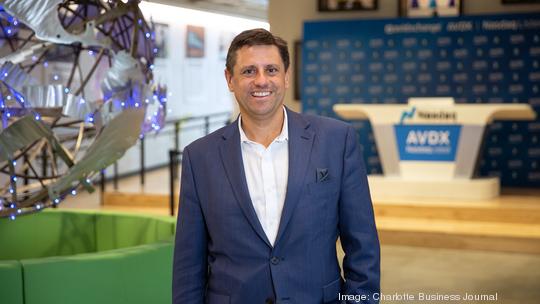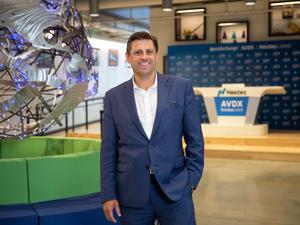
Eight months into running AvidXchange Holdings Inc. (NASDAQ: AVDX) as a public company, CEO Michael Praeger sees significant opportunities despite the increasingly uncertain economy. And he has emerged as one of the leading promoters of — and models for — Charlotte’s growing tech sector.
Praeger came to Charlotte in 1997 and promptly started his first software company. That was PlanetResumé, which focused on hiring of information technology specialists. He and his partners sold that business to a company called CareerShop.com in 1999.
Praeger started AvidXchange — another software company, this time focused on automating the accounts-payable systems for middle-market companies.
The first targets were real-estate businesses, which he had learned from friends in Charlotte were struggling with those operations. AvidXchange now has eight target industry “verticals.” They are real estate, community association management, construction, financial services, health care, hospitality, media and technology.
As AvidXchange’s target industries expanded, so did its services. A natural outgrowth of the accounts-receivable technology were payment-processing systems. And now, Praeger says, the company is adding a third system for cash-flow management called “Invoice Accelerator.” He expects that to grow into the company’s next major suite of products.
Praeger knows his company had the good fortune of going public near the top of the market last year. The initial public offering was designed to raise capital for growth, and he says those prospects are brighter in the current conditions.
The company’s basic products are designed to make companies operate more efficiently and with fewer people. Inflation and rising interest rates put that kind of efficiency front of mind for chief financial officers.
Acquisitions have always been an important part of the Praeger’s plans. The most recent was last year’s purchase of a company called FastPay, which established AvidXchange’s eighth vertical in media. He expects acquisition opportunities to grow in any downturn.
Praeger sat down with the Charlotte Business Journal recently to survey the company’s current position and what he sees ahead. An edited transcript follows.
Having gone public, do you see things different about the way you're operating or about your expectations?
There are a couple things that maybe surprised me a little bit. The time requirements to support the interactions with the analysts and public-company investor community. We have now roughly about a dozen analysts that cover AvidXchange, and each one of those requires some time on a routine basis to connect with, as does the investor base.
When you’re a private company, you have a very finite set of investors — just a handful, typically, of those venture groups that you partnered with. What that dynamic is like as a public company is thousands of investors and your top, say 25 investors, are typically more institutional. It requires some time every quarter to connect with that investor base.
What you quickly learn to appreciate being a public company, at least in the current market, there’s not a lot of relevance to what happens in the business day to day with what happens to your stock price. A lot of the stock-price elements are more back-room driven, more theme driven, than what’s happening in your actual business. And so, it’s important to keep our team focused on the things that we can control — our performance.
Has being a public company raised your visibility?
It’s hard to measure. I’d say within our different vertical markets, we already have a very strong following. But in the general, horizontal market, I would say it probably has elevated our presence for those that didn’t know who we were. In terms of web activity, inbound activity that we’re seeing, I think being a public company has probably had an effect.
You said in a recent investor presentation that AvidXchange suffers in some ways from a lack of competition. Why haven’t you seen more competitors moving into the market?
What I said was that typically we don’t see very many other third-party companies as competitors. Our No. 1 competitor is the paper process for payments that companies have now. A lot of times it’s easier to sell a customer a solution once they are evaluating, “Should I go with Company A or Company B?”
In our case, it’s “AvidXchange or my existing paper process.” So that’s a change-management element that is hard and takes a little bit longer for CFOs and controllers to make decisions.
As to why haven’t we seen very many competitors, the answer is because what we’re doing is really hard.
We’ve been at this for 20 years, and we manage 220 different accounting systems, interfaces and integrations that we have with all the different systems across the middle market. It’s taken those 20 years to build all those integrations to support all our different (customer) verticals.
And another element is how regulations have evolved. To do what we do today, you have to be a licensed money-transmitter in the 48 states that now require licenses. That is about a three-year process, and it can cost you several million dollars to get licensed.
Also, some of those states have a minimum tangible net-worth requirement — between $25 million to $50 million. As a startup company, it’s difficult to get licensed and then be able to develop the feature set that we have that works with all these different accounting systems.
Do you see growth coming from an expansion of services or from expanding the industry verticals you target?
It comes from both. One new service we are really excited about is what we think would be our third main business line over time. That’s a solution for the supplier side of our payment network, called Invoice Accelerator. And what Invoice Accelerator does is it allows any supplier who may be waiting on, say, 30 days to get an invoice paid, they can raise their hand at any point and have next-day payment.
It’s a small and rapidly growing business for us today, and we believe it’s going to be a big business for us in the future.
And do you see other businesses that are now in your general group as potential new areas for more focused verticals?
We expect that we will continue to declare one to two new verticals every year, and so that would be a natural part of our growth.
We look at the characteristics of the verticals that we’ve been successful in and how can we apply those characteristics to other verticals. And we naturally look for where we’re already attracting customers.
The reason why we have a health-care facilities vertical is, a couple of years ago, we saw that we were tracking large number of long-term-care facility companies. And we saw they were being successful in our platform, so we thought we should create a dedicated focus to attract more long-term-care centers as well as other health-care facilities that have similar characteristics.
Our direct-sales, go-to-market strategies are around these verticals. But we’re tracking companies across many different industries that come to us through the web or contact their bank or contact their accounting system and those partners are referring them to us.
You have become a leading advocate for Charlotte’s tech sector. What’s the take from 20,000 feet on where it stands?
I moved Charlotte in '97 and built two software companies. I am a big fan of the tech ecosystem here, and it’s come a long way.
When I think of what it takes to build a successful entrepreneurial ecosystem, I think it takes a strong public-private partnership with the local government — which, with the city of Charlotte, we definitely have. I think back to Mayor (Pat) McCrory to the current mayor there, is a very strong pro-business environment.
Second, it takes the university system. And I think how UNC Charlotte has evolved, and their focus in computer science and data analytics really lends itself well to the type of industries that are in the greater Charlotte market.
And then the last thing is some examples of entrepreneurs that have been successful in building other companies. I think now we have some of those examples.
Then you add what I call the intangibles —the weather, the quality of life. Charlotte is a great place to be. People are relocating to Charlotte for lots of reasons, and I think when you combine that with the three things that I listed, you end up with really an attractive market.
Do you consider AvidXchange as part of the fintech — financial technology — sector?
Fintech is an interesting word, because it incorporates a lot of things. I think we fall into that category. We are at the core intersection for fintech. I really liked the approach that UNC Charlotte’s taken by leaning into data analytics as one of their differentiators within computer science. And I think that lends itself well to what Charlotte’s becoming known for. I think it’s really smart of Charlotte to triangulate around becoming that fintech hub.
How do you look at the uncertain economy now, and how will it affect AvidXhange?
I talk to our team about it a lot — the debate on whether there is going to be a recession or not, to rising interest rates and the impact of inflation. Today we are not seeing any effects in our business. Our company is performing very well.
However, we want to position ourselves to be able to do better as we exit any potential recession because of how big our balance sheet is. Now, as a public company, we can be in a position that we can accelerate as we go into a downturn. Certainly, private companies will struggle in terms raising additional capital, so we think there’s going to be lots of growth opportunities that will present themselves to us. We want to be inthe best position to take advantage of them.
Through acquisition?
We think there’s going to be exciting acquisitions and, just generally, we will grow through the acceptance of our products. CFOs are increasingly focused on eliminating headcount, not growing their staff, how do they do more with less. Our solutions play into that theme of allowing our customers to be more efficient.







